As millions of voters across Los Angeles County decide how to cast their ballots in the pivotal race for district attorney, KNX News and the Los Angeles Times presented a live debate between incumbent D.A George Gascón and his challenger, Nathan Hochman.
KNX News anchor Mike Simpson and chief correspondent Charles Feldman moderated the debate, with a panel of journalists asking the questions, including L.A. Times reporters James Queally and Brittny Mejia along with KNX News reporter Emily Valdez.
Recent polling showed 35% of likely voters are still undecided in the race.
Listen to the full debate here:
*The debate QnA has been edited for clarity*
Feldman: What exactly is your philosophy on the role of the district attorney in society, and how does that impact the actual functioning of the office?
Hochman: “I believe the district attorney actually serves three roles in the criminal justice system: a before, during, and after role. The before rule is you gotta get to the kids … During phase is when people enter the system, you have to approach it in a smart, effective, but proportional accountability regime. And the after is you gotta actually invest in prisoners, you gotta make sure that we don't have prisoners come out and 50% of them will be back in prison committing more crimes.”
Gascón: “Here's what I believe the role of the district attorney is overall, is the safety of our community, but the safety not just for one community, but for every community. It’s looking for the best ways to achieve the best path in order to ensure accountability, in order to assure the people are safe in our community, and in order to assure the people when they come back from prison, they're gonna have a place to come that is better than the place in what they went in.”
Simpson: Gascón, you came into office with a mandate for progressive reform, but since then, you’ve been forced to change some policies either because of public backlash or a court order. Give me a few things you would do differently going forward, given the realities of the past four years.
Gascón:”I have come into the office with a clear path of reform, but a balanced reform. As we have traveled through the last four years, when it has been appropriate, we've made adjustments to the policies and we'll continue to do so … Let's take organized retail theft, for instance, right. Organized retail theft was a thing, but not the thing that it became in the last two and a half, three years … We adjusted our path to dealing with organized retail theft because I recognize that there were differences in the needs.”
Simpson: Mr. Hochman, your opponent came into office on that progressive agenda. There are plenty of voters in this county that truly believe in some of those ideas. Would you implement any of that? What does your “hard middle” look like?
Hochman: “The hard middle is a rejection of extreme policies … The hard middle approach does not go ahead and say we go back to mass incarceration. Just the opposite. It says that we look at each case individually and we make the smart effective and proportional approach so that the crime is proportional, excuse me, the punishment is proportional for the crime committed.”
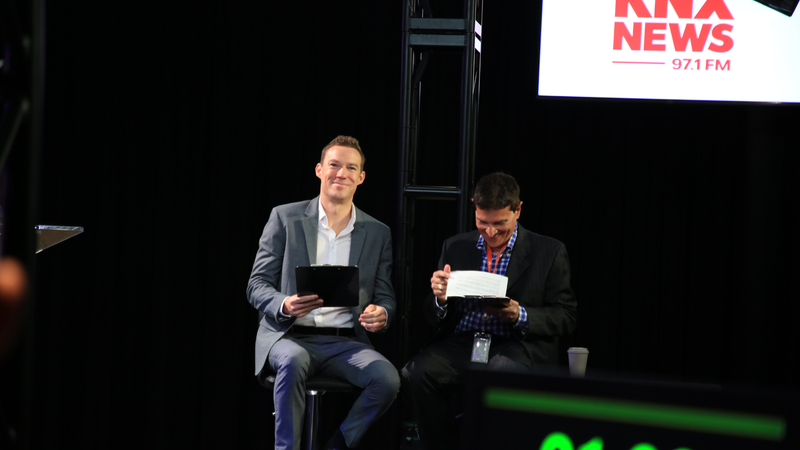
Queally: Mr. Hoffman, you've noted that California Department of Justice records show violent crime is up about 8% from 2019 to 2023 countywide. Mr. Gascón, more recently, you focus on the fact that this year, year to date, as of this moment, violent crime is down in the city of L.A. by about 6%. You’re both right. Please explain to what extent a DA’s policies actually impact day to day crime rates and what you would do specifically, if elected or re-elected, to lower violent crime.
Hochman: “Mr. Gascón likes to focus on the L.A. city statistics because they have a blip in his favor … What we can do differently, again, get rid of these extreme blanket policies. Go back to a hard middle approach that allows prosecutors to actually do their job, empowers law enforcement to go ahead and do its job and lets victims know that if you dial 911, not only will someone go ahead and answer the phone, but you can get justice for the harm suffered and criminals will understand where the lines are.”
Feldman: We looked at the Public Policy Institute of California crime survey in 2022, and it found – this was during the peak of the COVID surge – it found of the state’s 58 counties, 36 saw violent crime rise. Most of those counties did not do not have DAs who you would probably consider to be progressive. How do you reconcile that?
Hochman: We should not be ‘no worse than’ any other DA’s office out there. The L.A. County DA’s office used to be the gold standard by which all other DA’s offices had been measured. Mr. Gascón lost the support of 98% of his prosecutors because he's imposed on them a regime of ‘no worse than.’”
Gascón: “The ‘gold standard,’ I guess, was being the most carceral county in the country. The gold standard was sending more people to death row than any other jurisdiction in the country. The gold standard is sending kids to adult prison. The gold standard is looking at police misconduct and continuing to provide cover for bad police conduct … The reality is that my opponent continues to misstate the facts because it is convenient for him when he can. And this is the same thing that he did two years ago when he was running for attorney general – a dystopian view of where things are instead of coming to the table, rolling up your sleeves, and talking about what can we do differently in order not to make the mistakes of the past.”
Mejia: All recent polls show property crime is a huge concern for voters, and the data shows it’s up 14% in L.A. County from 2019 through last year. There's clearly a sense that these crimes are not being solved and prosecuted. What are you as DA going to do about it?
Gascón: “Understanding the role of district attorney, we don’t patrol, we do not make arrests. We prosecute when cases are presented to us. And if you look at cases, we're prosecuting cases around a 90% rate when they're presented to us … My work is to make sure that when police bring somebody for prosecution that we would do everything that we can to hold that person accountable.”
Mejia: California Department of Justice data shows police in L.A. county made arrests in less than 1% of all property crimes from 2019 to 2023, so how does a DA hold such criminals accountable if the police aren't bringing them in?”
Gascón :”Generally the rates of police arrest, especially with property crime, has always been low because it is very difficult for the police to identify, for instance, residential burglars … The reality is that the problem of policing certain crimes is not unique to our county, frankly is not unique to the moment. But the job of the district attorney is not to police. The job of the district attorney is to prosecute.”
Hochman: “The police aren't bringing in the cases because they know up front that the DA’s blanket policy is not to prosecute. So that's when I was speaking about those 7-Eleven owners, they used to report those cases to the police. They had portrait quality video of the person that stole the stuff from their store. But they've been told by the police, the DA’s office has these policies, and they have actually stopped reporting those type of crimes.”
Gascón: “Our filing rate in residential burglaries is nearly 90%. People are being held accountable … If Mr. Hochman is suggesting that the police are not making arrests because we're not prosecuting the cases, I think there's two problems with that. Number one, it’s not supported by our filing rates, but number two, that would be a bigger problem in our community.”
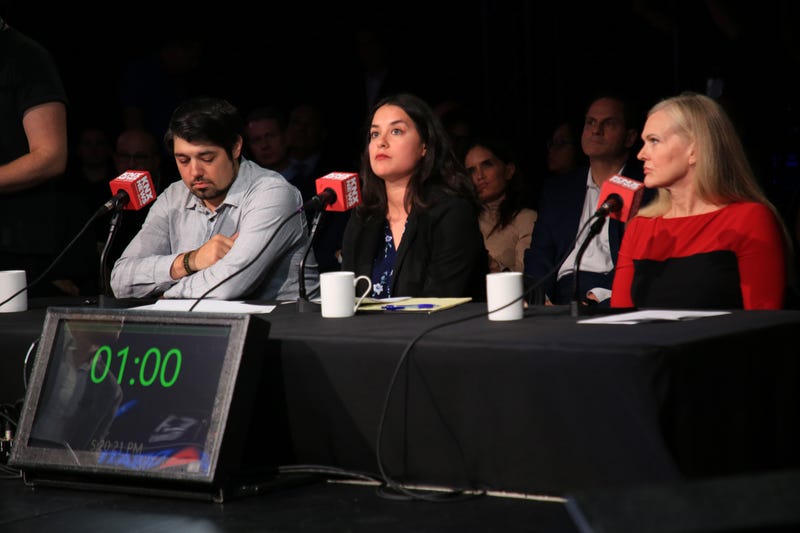
Valdez: Mr. Gascón, last week you announced that the convictions and sentences of Eric and Lyle Menendez are gonna get a new look from your office. Why did you decide right before the election that you’re gonna take a look at the case after you’ve been postponing it for a year and a half?”
Gascón: “We had a hearing schedule for November 29th of this year. This case has been moving along the track with many other cases. When this Netflix documentary started to show recently, we started to get many, many media requests for information. Initially, we tried to answer them individually. I came to the conclusion that it was better to handle it all at once, and that's what we did.”
Valdez: Should the murder convictions of Eric and Lyle Menendez, or the sentencing, should they be reviewed? And how would you approach this type of case where, in 2024, child abuse could be considered a mitigating factor?
Hochman: “I would get deep, deep into the facts. That's the advantage of actually having prosecuted and defended cases, real cases, for 34 years … Ultimately, I would gather all those facts, gather all the opinions and make a decision and you certainly would not have me hold a press conference to tell you I’m just thinking about it.”
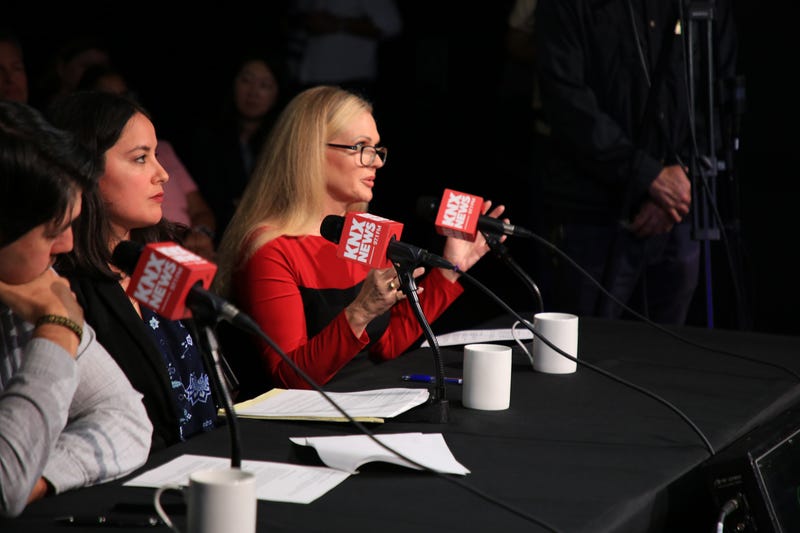
Queally: If you're elected, Mr. Hochman, what steps would you take to remedy wrongful convictions or resentence defendants harmed by past prosecutorial error?
Hochman: "So if I'm the D.A. I will be the first D.A. in history that not only has a prosecutorial background but a defense background. I go into court for the last 24 years to go ahead and overcome the government's cases, and uphold the presumption of innocence.
Jackie Lacy started the Conviction Review Unit in 2015, and Mr. Gascón renamed it, calling it the Conviction Integrity Unit. I would certainly keep that unit.
I've actually spoken to people from the Innocence Project, and I've told them that, look, if someone is in prison, even for a day, who's otherwise factually innocent, I have visited over 12 prisons... I've seen the horrible conditions that it is to be a prisoner, they need to get out that very day if they are factually innocent. So I will work with the prosecutors in those units as opposed to Mr. Gascón, who, when he got an unfavorable decision recently from one of the heads of that Conviction Integrity Unit, transferred her."
Queally: Mr. Gascón, you ran on the issues of wrongful conviction and undoing what you consider overly harsh past sentences. However, even some of your supporters have been slightly frustrated with the results. So, what would you do differently in a second term on either the conviction, integrity, or resentencing front?
Gascón: "I will answer your question in a second, but let's go back to Mr. Hochman's defense record.
He defended billionaires who avoided paying their taxes. He defended the most corrupt sheriff in L.A. County's history, and after that sheriff was convicted, he held a press conference, pinned another little badge on this particular sheriff, and said, 'You deserve to have this' because the judge had told him that he could not wear it in front of a jury.
What would I do differently? You're absolutely right. I believe that we're still moving way too slowly, but the reason why we have moved so slowly and the reason why I want to make sure that we continue to improve this process more than we have in the last year is because we look at these cases very closely.
The fact is that only four people year to date from the very beginning have actually been rearrested of over 300 people. We take this very, very seriously.
At the other end of the spectrum, we know that there are many people who qualify for resentencing, just like we know that there are many people who claim to be wrongfully convicted and need to have their cases reviewed.
My goal is to continue to have the resources we've had recently and to move forward if I am honored to be reelected."
Queally to both: Quickly explain the purpose of pursuing the death sentence in a state where there's a moratorium on executions.
Hochman: "This topic brings out passionate interest on both sides, but when I take the oath as D.A., I'm going to swear to uphold all the laws of the State of California. Right now, the death penalty has been on the ballot twice in the last 15 years, and the voters of the State of California have rejected it.
So in the very rare cases in which it applies, for instance, you have a cold-blooded assassination of a police officer... the death penalty, according to the law, must be considered. If I'm the D.A., I will uphold the law.
If Mr. Gascón wants to not follow the law, he should run for the state legislature or for Congress."
Gascón: "First of all, the problem is, it is precisely those very rare cases where there is a lot of political pressure for the police to make an arrest and for the prosecutor to get a conviction that wrongful convictions occurred.
I don't know about you, but for me, one innocent person being executed is one too many.
This particular office has been known to prosecute people that have been later found to be innocent, including seeking the death penalty as they did in the case of Maurice Hastings, who was accused of murder and rape.
Thankfully, the jury did not grant the death penalty. He spent 38 years in prison before we found out that he was an innocent person, and not only that, but the person that committed the murder and rape went out to rape another woman and wound up in prison and eventually perished.
The reality is that the death penalty has no place in modern society. The likelihood of mistake is real. We have seen it in our own office. There are many cases around the nation, and I am unwilling to do something that may cause the execution of an innocent person."
A KNX News listener asked, What is your response to families who no longer feel safe in L.A. County and are looking into moving elsewhere because of all the crime we hear about, and what would you say to convince them that they will be safer in the next four years?
Hochman: "Mr. Gascón would say crime is down, so fear is up, so I guess it's your imagination that you're feeling any unsafeness in your community.
But that's not true.
The California Department of Justice says this at the statistical level, but I've spoken to the people, Mr. Gascón; I've spoken to people who, for the first time, have had their homes broken into, their businesses broken into their cars broken into. I've spoken to parents who have lost kids from fentanyl poisoning.
They look to the D.A.'s office to do its job, to hold defendants accountable, but do it in a smart, proportional, and effective way.
So I would say, four more years of Gascón, you might get your bags packed and go join the people who have left Los Angeles if you care about your safety.
But if you do care about your safety, this November 5th election allows you to go ahead and do something about it. Vote in a new district attorney myself."
Gascón: "First of all, I am very sorry that you are feeling the way that you are. By the way, you're not alone; there are many people in our community who are fearful.
Many people have been victims of crime, not only recently but also in the past, and part of my job is to be out there, as I do every day, and do everything I can to not only address your fears but also address crime problems.
The reality is that we as a society need to continue looking for solutions because the crime problem is not unique to L.A. County. It is around the nation, and one crime is one too many crimes.
But I tell you what I will not do, which my opponent does on a regular basis, is fear-mongering.
The dystopian view of our community feeds into the worst of us instead of looking to see how we can work together to have a better future and do it not from a place of privilege but from a place that can actually walk any community in this county, and understand that sometimes the sense of justice in a poor community is gonna be a slightly different than another community.
People in every community want to be safe, but that safety sometimes looks slightly different because often, we have communities that have been not only overly punished but have been forced to deal with not only crime in their community but also the abuses of the system."
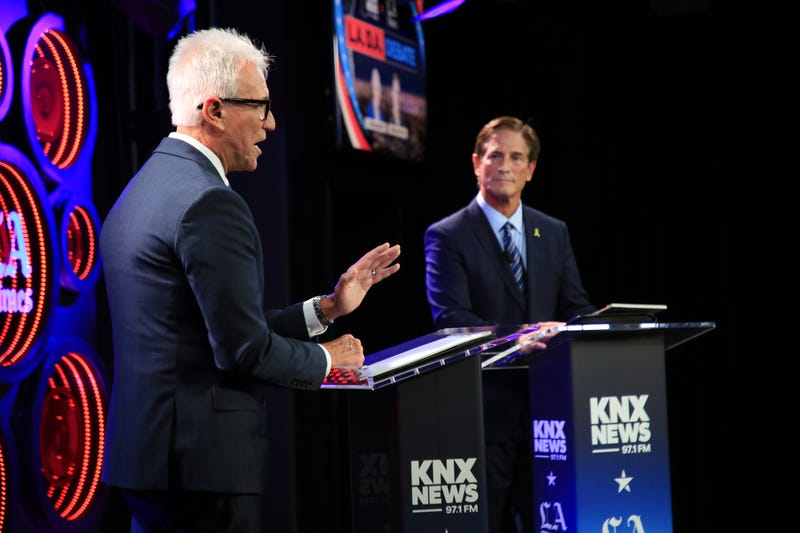
Feldman: Many people associate homelessness and drug abuse with rising crime. What will the D.A.'s office do to solve what seems to be a very intractable problem?
Gascón: "As a district attorney, I will hold everybody accountable equally.
When a person that is unhoused causes harm to others, they're being prosecuted at the same rates that anybody else.
We also have to deal with jurisdictional questions in our county that often create a lot of confusion because if you're in some cities like the city of L.A., you have a city attorney that deals with misdemeanor crimes and then you have the district attorney that deals with felony crimes.
Here's what I have been doing, and we'll continue to do.
Number one is to work with our board of supervisors and other stakeholders to make sure that we increase the number of beds that we have available for people who are mentally ill and are also committing crimes and causing harm.
Number two is to recognize that our job is not to over-criminalize or to criminalize poverty and to understand that when we do that, we actually create more housing and security as it was done before in the office where people are often committing simple things like driving without a license, were taking away their car, they were prosecuted and then they lost the ability to go to work and then they lost their job and they become on house."
Hochman: "What this D.A. has enacted is blanket policies that say he is not going to prosecute quality of life crimes.
What does that involve? That if a police officer comes up to a homeless encampment and sees someone shooting up with meth, heroin, fentanyl, he won't let them prosecute.
If he sees them engaged in vandalism, no. Disorderly conduct, no. Criminal threats, no. Loitering or prostitution, no.
So, under this D.A., the police basically look at it and just keep walking.
We can actually do something about it, but the D.A.'s office has to be a partner with the Los Angeles Homeless Service Authority, the Department of Mental Health, the Department of Public works, the Department of Vocational Services and go into those communities.
So, if the D.A. is part of the solution and a partner with them, It'll work."
Mejia: Given the rise in fentanyl overdose deaths in Los Angeles, what steps will you take as district attorney to address the distribution and trafficking of fentanyl?
Hochman: "About three years ago, I met a couple who sadly had lost their 16-year-old son to fentanyl poisoning.
I went ahead and found out that the state legislature would pass a law, Alexandra's Law, that was going to tell first-time dealers that if they do that crime again and they die, they could be charged with murder.
I then wrote a letter to Mr. Gascón and 457 other district attorneys saying as a private citizen, you need to implement this law to send this message to make sure the first-time dealers do not become second-time dealers.
I'm here to say that 12 district attorneys across this state implemented Alexandra's Law in plea agreements, but Mr. Gascón sits silently on the sidelines.
I believe we need not only an enforcement effort but a massive education effort that goes into the fifth grade, the middle school, and the high school and tells these kids that fentanyl is not about getting high; it's about dying."
Gascón: "I'm glad that my opponent recognized that public education is an important piece of this.
Here's what I did. Rather than having a concept of a plan, this is a plan that we implemented:
We put together a task force, and we brought together police, we brought in public health, we brought in education, and we brought in families of victims of fentanyl, and that task force continues to work today.
The work has been very clear. We go after the traffickers, and yes, we have prosecuted a couple of people for murder.
We also recognize that this is a public health problem, and we do not want to go back to the days of the war on drugs.
My opponent keeps talking about what he would do, but on the other hand, he continues to talk about prosecuting to the fullest extent and making sure that people who are in prison stay there full-time.
There is so much cold talking about mass incarceration, so much cold talking about the war on drugs, and very little about how to get the work done and understand the realities.
Most of what my opponent is talking about is either fictional in terms of what he will do because he has no control or some things that are outside his purview.
He forgets to tell you that when we're talking about the homeless, for instance, the L.A. city attorney is the one working with housing advocates in the city."
Queally: Mr. Gascón, the D.A.'s office has been more aggressive in filing charges against police officers since you took office, but the courtroom results have been mixed. What would you do differently in a second term on that issue?
Gascón: "Over 150 police officers have been prosecuted over 125 cases involving those 150 police officers, and we're getting some convictions.
We continue to address the problem of our system's culture, which often means that even when a police officer commits a crime, they are not held accountable.
We had a case where we had clear evidence from a body-warm camera. We presented that case, which, by the way, was filed by my predecessor and lost it because the judge said that the officers had not been trained in the definition of self-admission.
So this area requires a lot of work to be done, but the reality is that we have moved the needle but we're far from being what we need to be."
Queally: But what's the answer to improve the courtroom success?
Gascón: "We will continue to improve the level of our services and learn as we see others in different parts of the country doing the work and getting better results."
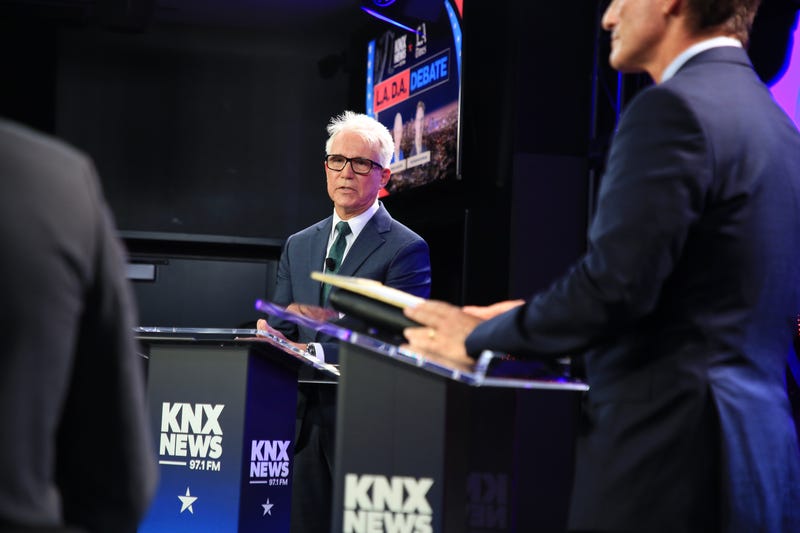
Queally: Mr. Hochman how would you handle prosecutions of police officers differently? And how would you respond to any voter concerns about impartiality considering you've been endorsed by a large number of police unions and received millions in contributions from them?
Hochman: "I will lead by example in a way that Mr. Gascón can't because he's never actually prosecuted a police officer, for that matter, anyone else.
I will make sure that if we do bring a case, that case will withstand the reasonable doubt threshold, and we will actually get convictions that Mr. Gascón has failed to do.
No, I'm not too close to the cops. When I speak to police officers, I make it crystal clear, if you cross the line, you will be prosecuted. And you know what they say, 'nobody hates a bad cop more than a good cop.'"
Feldman: Would your office prosecute the parents of Children who use guns to commit violent crimes?
Hoffman: "To the extent that the law allows that type of prosecution and to the extent that the facts show beyond a reasonable doubt that a particular parent violated that law, then we would certainly consider those prosecutions because that's my job.
Gascón: "Each case stands on its own. I believe that if we can show that there was a violation of the law, that was the cause of the death of many kids or any kid in the use of a gun, we will entertain the prosecution of the case. If it is appropriate, the answer will be yes.
CLOSING STATMENTS:
Gascón: "This is really a place of where there are clear options here and words and actions matter.
When you listen to my opponent, you're often listening to code talk for mass incarceration.
You're often listening to someone that believes from a very privileged point that he has the answer for the rest of our community and is very willing to take us back to where we were before.
His actions also matter. While I was working with our future President Kamala Harris as a district attorney, and supported her for attorney general, and now trying to help her get elected, he was actually working against her by supporting the Republican opponent that run against her for attorney general by endorsing him and giving him a $6,000.
This is a man that will tell you what you wanna hear depending on where he is.
I have been working with people like Kamala Harris for a year. I worked with her when she was a district attorney, working on the safety of our community. I work with her to make her an AG and I will continue to work with her.
The difference between my opponent and I is that he's an opportunist, and I am an optimist."
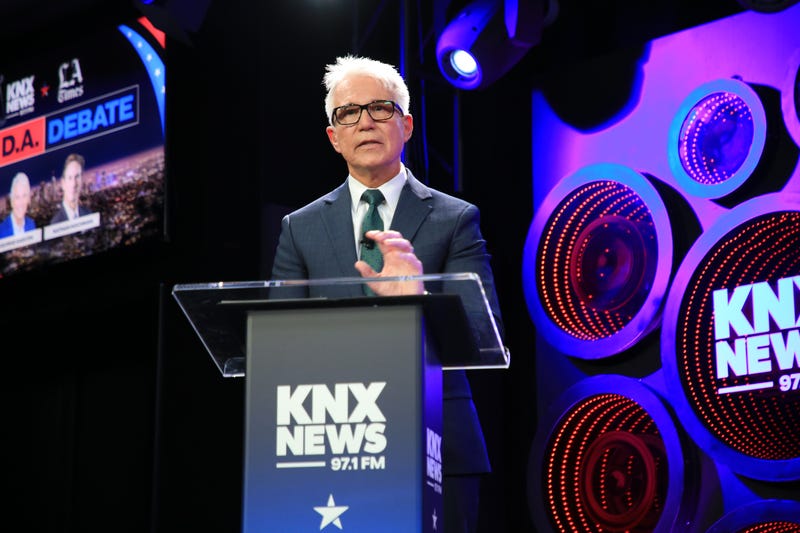
Hoffman: "There he goes again, George 'Gaslight' Gascón.
He knows that I have adopted a hard, middle, balanced, smart, effective, proportional criminal justice approach, but he wants to go ahead and gaslight you and tell you, I haven't.
I'm a centrist and I've been a Democrat for 20 years, a Republican for 20 years, and now I'm an independent because we actually need to have politics out of the office.
He knows that I didn't vote for Donald Trump, and I've actually voted for and will be voting for Kamala Harris in this particular election.
He also knows that I'm pro-choice my entire life, pro LGTBQ rights, but he wants to engage in these tropes - his own version of fear-mongering to convince you that I am someone who I am not.
The reason I'm running for D.A. is I basically look at this situation where I need to support parents, I need to support families, I need to support store owners, victims, law enforcement prosecutors. As a lifelong Angelino, I'm gonna fight for what I love and I ask you to join me."
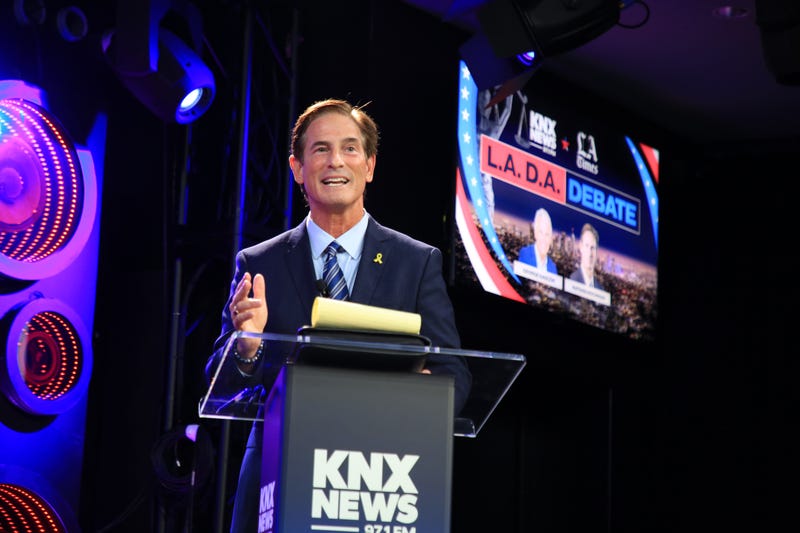
Watch the 2022 KNX News L.A. Mayoral Debate between Karen Bass and Rick Caruso:
Follow KNX News 97.1 FM
Twitter | Facebook | Instagram | TikTok
